The most unpleasant part of getting acne is its after-effects, which are acne scars. If you are searching for some home remedies to get rid of acne scars, this blog is for you! Acne scars are very common, and you should not be ashamed of them. However, acne scars are not permanent. There are certain treatments available. Some treatments almost completely remove the scars, while others assist the skin in healing itself with its collagen. Around 80% of the population between the ages of 11 and 30 years will have acne, and one in every five will have scarring. Acne scars can affect your self-esteem, cause psychological distress, and interfere with your social life1. However, you can try some of these home remedies to get rid of acne scars.
The causes of acne include:
Acne forms when bacteria, dead skin, and oils clog the skin pores, which leads to inflammation (swelling). Acne can appear more on the skin areas with sebaceous (oil) glands, mainly on the face, chest, and back.
Acne scars are formed due to the inflammation of acne. Some scars are superficial, while others are deep. Superficial scars are shallow and can heal quickly. Acne swells and then breaks, and the contents leak into the surrounding tissue, causing deeper scars. The skin heals the scar by generating new collagen (a type of protein) fibers1. Scar occurs when the body tries to fix and cure acne1.
Acne causes visible symptoms like depressed (also called atrophic) or raised (also called hypertrophic) scars that appear on your skin in the following way:
The depressed/ atrophic scars usually appear on the face, like an ice pick, boxcar, and rolling scar1,2.
Raised/hypertrophic scars protrude from the skin and are caused when collagen overgrows on the skin. These scars are usually found on the jawline, shoulders, chest, and back2. They can be itchy or painful.
There are different grades of acne scars, including macular, mild, moderate, and severe.
Some of these home remedies might be helpful for macular and mild scars.
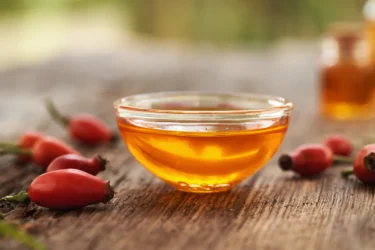
Rosehip is rich in vitamin C, which helps in dealing with acne scars3. Rosehip seed oil (RHO) is one of the compounds that is used in cosmetics for the improvement of skin scarring. It has been used for years to manage scars. It contains a high level of essential fatty and unsaturated fatty acids that play a significant role in penetrating the skin and dealing with acne scars4. You can apply the rosehip seed oil directly to the scar area.

Ladyfinger has several health benefits and is a nutritious food. It is rich in vitamin A and C and has various antioxidants. In addition, it has beneficial effects for dealing with acne scars. It also lowers skin irritation5. You can take some ladyfinger, cut it into small pieces, and grind it. Also, you can add honey, lemon juice, and tea tree oil to it. Now, you can apply this paste to your face and leave it for 30 mins. As the paste dries, wash your face with cold water.

Lemon helps in lowering the risk of developing acne scars. It acts as a disinfectant (destroys bacteria), exfoliant (removes dead skin), and skin lightener and also helps in preventing the formation of new pimples. You can squeeze some lemon, and the lemon juice obtained can be applied to the face with the help of cotton. You can dab some lemon juice on your face and wash your face with cold water later6.

Periwinkle paste might be helpful for acne scars. You can make a paste with fresh leaves of periwinkle, neem, and turmeric and apply it over skin scars. This paste gives excellent results when used regularly7.

Brahmi is a well-known medicinal herb known to have anti-inflammatory and antioxidant properties8. You can take a few leaves of brahmi, mash them, and mix with some turmeric and lemon juice. This paste can be applied to the face. It has the potential to remove scars and acne.
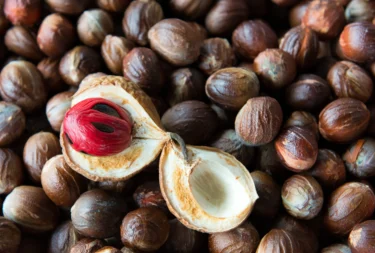
Nutmeg has anti-inflammatory and antioxidant properties. A nutmeg paste made with milk or water can be applied to acne scars. You can also take nutmeg and cinnamon powder and mix it with honey. This paste can be used on the face. Later, you can rinse your face with cold water. This will help you manage acne and also reduce scars7.
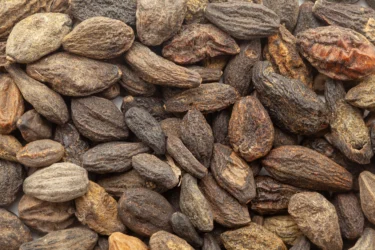
Haritaki has medicinal properties like anti-inflammatory and antioxidant activities. You can apply the paste of haritaki to manage acne. It not only benefits acne but also helps to prevent scarring7.

Also Read: Home Remedies For Tanned Skin
Although acne scars are common, the longer you wait for your acne to heal on its own, the more likely the scarring will occur. Therefore, it is advisable to consult your dermatologist (skin doctor) as early as possible to avoid the further worsening of the condition1. Remember to consult your doctor and not self-medicate.
Also Read: Natural Home Remedies for Stretch Marks
Acnes are very common, and so are the scars caused by them. This article provides you with home remedies that may be useful in dealing with acne scars. These home remedies include rosehip seed oil, periwinkle, brahmi, nutmeg, okra, lemon, and haritaki. However, it is best to consult your doctor to prevent these scars from worsening further.
Also Read: Natural Home Remedies for Ringworm
Yes, acne scars are very common. However, acne scars are not permanent. There are various treatments available now1. You can also try the home remedies mentioned above; they might benefit you in dealing with acne scars.
It is best to consult your skin doctor to diagnose the type of scar before the scar worsens. They will recommend you treatments that will help you get rid of those acne scars.
There are many home remedies that you can try and that might be beneficial for you to manage your acne scar. Home remedies like rosehip seed oil, ladyfinger, lemon, periwinkle, brahmi, nutmeg, and haritaki might help with acne scars. First, however, consult your doctor to know more about your acne scars.
Yes, rosehip seed oil might benefit you to manage the acne scars. Rosehip is rich in vitamin C, which helps in healing acne scars3. You can apply the rosehip seed oil directly to the scarring area.
Yes, ladyfinger helps in dealing with acne scars. Ladyfinger is rich in vitamin A and C and has various antioxidants. It has beneficial effects on acne scars and acne and reduces skin irritation. Hence, ladyfinger might be helpful for managing acne scars5.
Disclaimer: The information provided here is for educational/awareness purposes only and is not intended to be a substitute for medical treatment by a healthcare professional and should not be relied upon to diagnose or treat any medical condition. The reader should consult a registered medical practitioner to determine the appropriateness of the information and before consuming any medication. PharmEasy does not provide any guarantee or warranty (express or implied) regarding the accuracy, adequacy, completeness, legality, reliability or usefulness of the information; and disclaims any liability arising thereof.
Links and product recommendations in the information provided here are advertisements of third-party products available on the website. PharmEasy does not make any representation on the accuracy or suitability of such products/services. Advertisements do not influence the editorial decisions or content. The information in this blog is subject to change without notice. The authors and administrators reserve the right to modify, add, or remove content without notification. It is your responsibility to review this disclaimer regularly for any changes.
People of all ages can complain about chest congestion from time to time. Chest congestion might cause chest tightness and occurs because of swelling of the airways and accumulation of mucus in the lungs, which makes breathing difficult. It is the result of bacterial or viral infection. These infections affect the lungs, either in larger airways (bronchitis) or smaller air sacs (pneumonia). People of all ages may experience chest congestion, but the elderly, children, smokers, and people who suffer from long-term illnesses are more at risk1,2. If you are wondering about chest congestion home remedies or how to remove cough from the chest, there are many natural remedies that can help you get rid of chest congestion within the comforts of your home. Continue reading to find out.
Did you know?
Chest congestion can be a symptom of chest infections. There are several types of chest infections, like bronchitis and pneumonia. These infections are caused by:
These infections are contagious and spread rapidly when the infected person coughs or sneezes and tiny droplets in the air are inhaled by other people. The infection can also spread if the infected person coughs or sneezes onto his or her hand, any surface, or object, and other people get in touch with these surfaces2.
The most common sign of chest congestion is the swelling of the airways and the buildup of mucus in the lungs, making breathing difficult1. If you have chest congestion, you might also experience:
Children may also experience:
Some home remedies for managing chest congestion that you can try are:
Drinking plenty of fluids will help loosen up the chest mucus and also prevent dehydration. A loose mucus is easier to cough out.2 You can increase your fluid intake by drinking plenty of warm water. You can also drink soups to help loosen up the mucus.
You can try steam inhalation with a bowl of hot water. This steam will ease your cough. Do not use hot water for kids, as the kids might get hurt2.
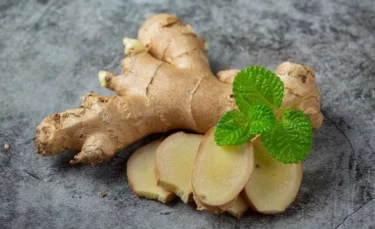
Ginger is a widely used herb that helps in various ailments, including cough, cold, bronchitis, and respiratory problems. To use ginger,
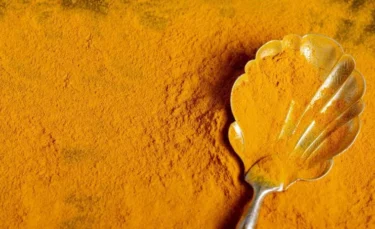
Turmeric presents many health benefits for humans. Turmeric is also good for managing cough and chest congestion. There are many ways by which you can make use of turmeric.
Thyme can be used to manage a lot of respiratory problems, including cough and bronchitis. Flavonoids present in thyme leaves also help by reducing inflammation (swelling). It also relaxes the muscles of the lungs and opens up the airways. To use thyme, you can make thyme tea by boiling crushed leaves of thyme. After boiling, the cup of thyme water is covered, left for some time, and strained afterward. You can drink this tea to get the benefits3.

Lemon is a valuable fruit with many health benefits. It contains vitamin C in ample amounts. Vitamin C helps in fighting infections. Lemon also helps in reducing swelling and inflammation. You can make a syrup using lemon juice to help fight cough. To use lemon juice, you may combine it with honey to make a syrup. You can drink this solution for chest congestion relief3.
Jaggery is helpful in relieving cough and chest congestion. The buildup of mucus is responsible for causing the feeling of congestion in the chest. Jaggery helps by aiding the expulsion of the mucus. To use jaggery, you can boil black pepper in water and put cumin and jaggery. You can drink this solution to get the benefits3.
Liquorice root possesses properties like expectorant (expulsion of sputum) and demulcent (relieving inflammation, irritation, and swelling). It aids in dealing with chest congestion by thinning the mucus and soothing the airways. To use licorice, you can make herbal tea. You can drink this tea to get the benefits of liquorice3.
You can use lavender oil by inhaling its vapours. You can directly put a few drops of lavender oil in hot water and inhale its vapours. If you have lavender flowers, go ahead, and put the flowers in a bowl of steaming water and inhale those vapours. Lavender oil vapor inhalation is an effective remedy for cold cough, bronchitis, and asthma. Therefore, it can be used to manage chest congestion3.
Also Read: Natural Home Remedies For Neck Pain
Peppermint leaves have healing properties. Peppermint contains menthol, which helps in breaking down the mucus. To get the benefits of peppermint, you can drink peppermint tea or inhale peppermint vapors by putting a few drops of peppermint oil in a bowl of hot water3.
Also Read: Best Home Remedies for Upset Stomach
If you are still confused about how to get rid of chest congestion fast, even after trying home remedies, it may be time to seek medical help. You should seek medical help if you:
All these may signify something severe and require immediate medical intervention.
Also Read: Fight Dry Hair By Using These 8 Home Remedies
Having chest congestion is quite common in people of all age groups. It is primarily a result of viral or bacterial infection. People at higher risk of developing chest infections need to take extra precautions. Also, if you are someone suffering from any chronic illness, you must take extra care. Although there are many remedies that you can try at home, natural herbs like thyme, lavender, and peppermint are quite effective in relieving chest congestion. Commonly found kitchen ingredients like ginger, turmeric, lemon, and jaggery can also be used. However, if your symptoms don’t improve even after using these remedies, you should immediately contact your healthcare provider.
Also Read: Home Remedies For Asthma By Dr. Siddharth Gupta
Some of the home remedies to relieve chest congestion are steam inhalation and, drinking lots of fluids to ease the cough, using natural ingredients such as turmeric, ginger, jaggery, lemon, thyme, and essential oils like lavender and peppermint2,3.
Chest congestion is a common occurrence in people of all ages. But certain groups are more at risk; these groups are the elderly and children. Also, people suffering from long-term illness and smokers have a higher chance of having chest congestion1.
Chest infections are the leading cause of chest congestion. To avoid chest infections, you need to maintain good personal hygiene, have a proper diet, and avoid alcohol misuse and smoking2.
Yes, you can use jaggery to relieve the symptoms of chest congestion. Jaggery provides several health benefits like aiding the expulsion of sputum that helps in dealing with chest congestion3.
Chest congestion is often more prevalent during colder months when respiratory infections are more common, but it can occur year-round due to various factors.
It’s generally advisable to avoid strenuous exercise while experiencing chest congestion, as it can worsen symptoms. Light activities and rest are recommended until congestion improves.
In some cases, untreated or severe chest congestion can lead to respiratory complications like pneumonia, especially if the underlying cause is a bacterial infection.
Disclaimer: The information provided here is for educational/awareness purposes only and is not intended to be a substitute for medical treatment by a healthcare professional and should not be relied upon to diagnose or treat any medical condition. The reader should consult a registered medical practitioner to determine the appropriateness of the information and before consuming any medication. PharmEasy does not provide any guarantee or warranty (express or implied) regarding the accuracy, adequacy, completeness, legality, reliability or usefulness of the information; and disclaims any liability arising thereof.
Swollen gums might feel abnormally bulging and protruding. It is a common problem where one or many triangle-shaped areas of gum between teeth swell. Gum diseases, also called periodontal diseases, affect the gums supporting the teeth. Swelling in the gums can be a symptom of underlying gum diseases, like gingivitis1.
If you have swollen gums, you should get help from a dentist to get a diagnosis and treatment. You can also try home remedies to take care of the swelling at home. Read on to find some herbs and remedies to help take care of swollen gums at home.
The most common cause of swollen gums is bacterial plaque, a thin layer of bacteria. Plaque results in various conditions of the gums, like gingivitis and periodontitis. These conditions can give you red and swollen gums3.
Swollen gums can also be a result of1:
Swollen gums can be a symptom of an underlying health condition like gingivitis. Features of swollen gums include:
Periodontitis is the progressive stage of gingivitis, which occurs if gingivitis is left untreated. Periodontitis is characterised by symptoms like2:
Here are some natural remedies that you can use to take care of your swollen gums at home. You should try the one that works best for you. These remedies involve some commonly found herbs that you can easily find in your house.
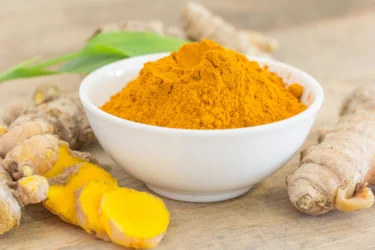
Turmeric has anti-inflammatory activity, which might help in reducing gum swelling. Turmeric is also a good pain-relieving agent, which might aid in pain relief. You can use haldi or turmeric to take care of your gums. Make a paste using turmeric, salt, and some mustard oil. You can apply this paste to teeth and gums to get rid of dental problems5. However, if you feel any irritation after using it, you should immediately rinse it off.
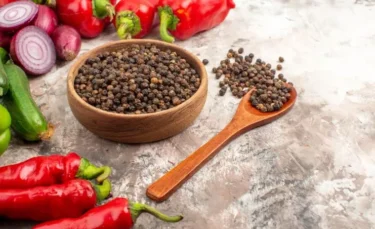
You can grind some black pepper to make powder and use this powder with mustard oil to make a paste. This paste can be used to massage the teeth and gums to steer clear of dental problems like swollen gums5.
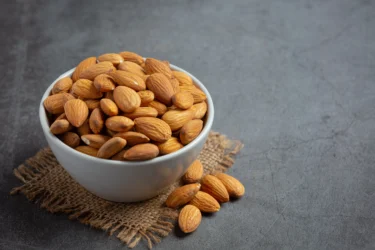
Almonds can be used as a remedy for gum problems. You can use the shell powder of almonds to take care of gum diseases. To make the powder, you can burn the shells of almonds, powder them and use them as and when required as a tooth powder5.
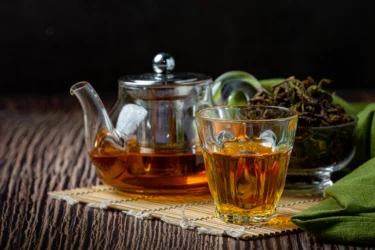
The antibacterial properties of green tea might help get rid of swollen gums4. You can try adding a few cups of green tea to your diet to help with swollen gums. However, avoid using this remedy if you are allergic to caffeine.
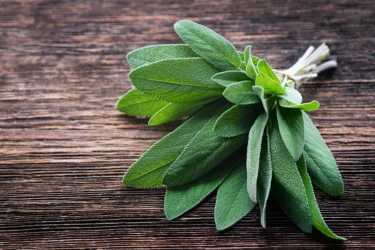
Sage is known to have antioxidant benefits, which might help soothe swollen gums8. You can use sage to make a mouthwash of your own by putting some fresh sage leaves into boiling water. Boil the leaves for some time before straining them. You can store this solution and use it as a mouth rinse. If you don’t find fresh leaves, you can use dried leaves as well.

The inflammation-reducing benefits of aloe vera make it an excellent natural remedy for swollen gums8. You can directly use pure aloe vera juice as a mouth rinse. You can also massage aloe vera gel onto the gums. Make sure to buy the aloe vera juice from a good source. Also, check if you have any allergic reaction to aloe vera; in such cases, avoid using it.
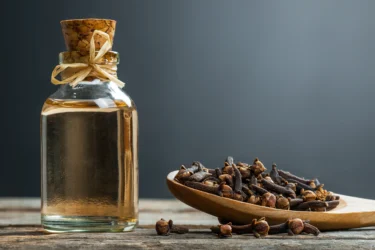
Clove oil helps prevent the growth and formation of bacteria, thereby preventing infections. Clove is also a good pain reliever and might help with pain associated with swollen gums8.To use clove for gums, mince some cloves, and use a cotton swab or cotton ball to apply the powder to your gums. Let the powder sit on the gums for some time. Rinse the clove off your gums once done.

Amla fruits contain vitamin C in ample amounts. Vitamin C is a potent antioxidant beneficial in many health conditions. You can include one fresh amla fruit in your everyday diet to help with swollen gums. You can also use amla powder by mixing it with some water. You can drink this water to take care of your swollen gums.
If you are suffering from allergies to the remedies mentioned above, you should avoid using them. Instead, choose a remedy that works best for you.

Here are some simple tips that can help you manage gum problems:
Also Read: Causes and Home Remedies for Shortness of Breath
Swollen gums are a common problem that some people may ignore. However, if the changes in your gums, the redness and swelling last for more than two weeks, you need to seek medical help.
Also, visit your dentist if your gum problems are associated with:
Also Read: Best Home Remedies for Burning Feet
Swelling in the gums is a common problem and can occur at any age. Most people often neglect gum problems, as sometimes there is no pain involved. However, timely management is necessary to prevent the problem from worsening. Some common household ingredients like turmeric, black pepper, clove, and amla can be used to take care of swollen gums at home. You can also make herbal mouthwashes at home using dried or fresh leaves of sage. Make sure to take into consideration any allergies before using such home remedies. Also, if the swelling in the gums becomes painful and is accompanied by bleeding when you eat or drink, make sure to get a consultation from a dentist.
Also Read: Simple Home Remedies For Dry Throat
Natural home remedies that you can make use of to take care of swollen gums are black pepper powder, turmeric powder, clove, and amla. You can also use aloe vera, sage leaves, and green tea to relieve swelling in the gums.
Yes, swollen gums can also bleed. This bleeding might become more evident when you eat or brush your teeth3. You can contact a dentist to get a better diagnosis of your problem.
Gum problems can be prevented by maintaining good oral hygiene. Practices like brushing the teeth two times a day, using a good toothpaste, and using dental floss might help prevent gum problems from developing7.
Yes, swollen gums can signify health conditions like gingivitis, but you need to consult with a doctor or dentist to get a proper diagnosis.
If your swollen gums do not heal within two weeks and cause bleeding and pain, you should immediately contact a dentist.
Yes, you can use turmeric for swollen gums. You can use turmeric powder and apply it to your gums to get rid of swollen gums. Turmeric is known to reduce inflammation and swelling as it has anti-inflammatory benefits. However, if you are allergic to turmeric, you should avoid its use. Also, if turmeric use does not work out and the swelling persists, seek medical help.
The antioxidant properties in sage leaves are helpful in many health problems. You can make a herbal mouthwash using sage leaves. Drop some fresh or dried sage leaves in boiling water, and let them simmer for some time. Cool it and store it. Use this mouthwash to take care of swollen gums.
Yes, salt water can help swollen gums. Rinsing the mouth with warm salt water (saline solution) can reduce inflammation and soothe gum tissues. The saltwater rinse can also help to cleanse the area and promote healing. However, it’s essential to maintain regular dental care and consult a dentist if the swelling persists or worsens.
Yes, certain foods high in sugars or acids can contribute to gum irritation and inflammation. Smoking or using tobacco products can also lead to gum problems. Adopting a balanced diet and avoiding harmful habits can promote good gum health.
Yes, certain vitamin deficiencies, particularly vitamin C deficiency, can lead to gum problems, including swollen gums. Vitamin C plays a crucial role in maintaining gum health, and inadequate intake can weaken gum tissues. A balanced diet rich in vitamins and minerals is essential for gum health.
1. Gums – swollen: MedlinePlus Medical Encyclopedia [Internet]. [cited 2022 May 6]. Available from: https://medlineplus.gov/ency/article/003066.htm
2. Healthdirect Australia. Gingivitis. Symptoms, Treatments, Complications and Prevention | Healthdirect. [cited 2025 May 19]. Available from: https://www.healthdirect.gov.au/gingivitis
3. Gum disease – Better Health Channel [Internet]. [cited 2022 May 6]. Available from: https://www.betterhealth.vic.gov.au/health/conditionsandtreatments/gum-disease
4. Agarwal G, Chatterjee A, Saluja M, Alam M. Green tea: A boon for periodontal and general health. Journal of Indian Society of Periodontology. 2012 [cited 2025 May 19]. Available from: https://pmc.ncbi.nlm.nih.gov/articles/PMC3459493/
5. Ayush Division. Ayurveda offers Herbal healing. Available from: https://www.esic.nic.in/attachments/publicationfile/7d11b02e5abb4717d53b4ce05efabd21.pdf
6. Gum disease – NHS [Internet]. [cited 2022 May 6]. Available from: https://www.nhs.uk/conditions/gum-disease/
7. Gingivitis: MedlinePlus Medical Encyclopedia [Internet]. [cited 2022 May 6]. Available from: https://medlineplus.gov/ency/article/001056.htm
8. Rani N, Singla RK, Narwal S, Tanushree N, Kumar N, Rahman MdM. Medicinal plants used as an alternative to treat gingivitis and periodontitis. Evidence-based Complementary and Alternative Medicine. 2022 [cited 2025 May 19]. Available from: https://pmc.ncbi.nlm.nih.gov/articles/PMC10630018/
Disclaimer: The information provided here is for educational/awareness purposes only and is not intended to be a substitute for medical treatment by a healthcare professional and should not be relied upon to diagnose or treat any medical condition. The reader should consult a registered medical practitioner to determine the appropriateness of the information and before consuming any medication. PharmEasy does not provide any guarantee or warranty (express or implied) regarding the accuracy, adequacy, completeness, legality, reliability or usefulness of the information; and disclaims any liability arising thereof.
Hiccups are nothing but repeated spasms of contractions of your diaphragm (muscle of respiration located below the lungs) accompanied by a hic sound from your vocal cords. Hiccups are a common phenomenon in people of all age groups. Anyone can get hiccups, and they are usually not a sign of something serious. Hiccups usually settle on their own after a few minutes. But if you experience hiccups for a prolonged period, it can be a symptom of underlying disorders.
Hiccups are mostly harmless and stop without treatment. But if your hiccups are bothering you, you can use simple home remedies to get rid of them. Hiccups don’t affect the quality of your life1,2.
The reason why people get hiccups is not clear. However, several factors might trigger hiccups, including irritated nerves and low carbon dioxide levels in the blood.
Hiccups can happen if you:
Did you know?
If you have hiccups, you might experience:
Generally, hiccups stop after a few minutes
Generally, hiccups will resolve on their own, but you can try these home remedies to get quick relief.

Breathing into a paper bag might help you stop hiccups. You can use a paper bag or any other bag available and breathe into it to get the benefits1.

It is recommended to hold your breath for some time to get rid of hiccups1. You can start by taking a deep breath and holding it in for some time (as long as you comfortably can) to help you stop hiccupping.

You can try gargling with ice-cold water to help you deal with hiccups3. Drinking iced water is also equally effective in getting rid of hiccups. You can also swallow some crushed ice to get rid of hiccups1.
Here are some common household ingredients that you can use as a remedy to manage your hiccups.
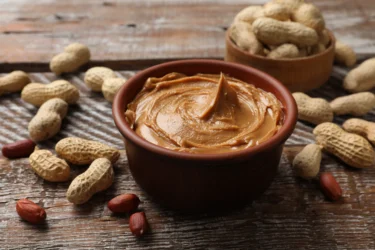
You can eat a spoonful of peanut butter to help with hiccups. It is a commonly found ingredient that can help with managing hiccups. So, if you have peanut butter in your house, you can try this remedy to get the benefits2,3.
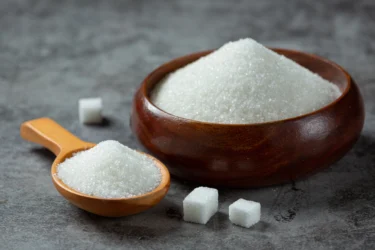
This is a simple and helpful home remedy for you to try. Granulated sugar is a common kitchen ingredient in every Indian household. You can try swallowing a spoonful of sugar to get rid of your hiccups2,3.

You can easily find a lemon in your kitchen; else, you can buy one as they are readily available in the market. You can take a lemon, cut it in half, and bite on it. You can also try sucking on a lemon wedge to help you stop the hiccups2,3.

Ginger is also a common ingredient that you can find in your house. You can use fresh ginger by chopping it and eating some pieces. Consuming ginger is known to stop the hiccups2,3.
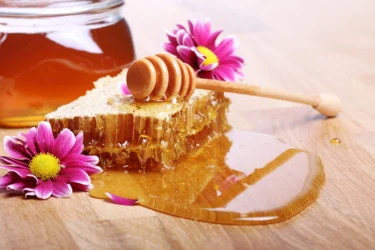
Honey is a common ingredient used in many Indian households. Honey is an effective remedy to deal with hiccups. To use honey, you can mix it in a glass of warm water. You can drink this water to stop the hiccups2,3.

You can also try some simple steps like:
Because the cause of hiccups may vary, not all these remedies will work out for everyone. However, these home remedies are simple and harmless, and you can try them unless you are allergic to any of the ingredients mentioned above. If you are allergic to any of the ingredients, don’t use them. You can try something else.
Hiccups are often benign and self-limiting. Patients with acute hiccups should be advised to try some aforementioned physical manoeuvres and should receive reassurance. In healthy patients with no overt cause for intractable and persistent hiccups, treatment of reflux may provide relief.
Dr. M.G. Kartheeka, MBBS MD(Pediatrics)
Also Read: Home Remedies For Tonsillitis
If your hiccups last for a few minutes or a couple of hours, a meeting with a healthcare provider might not be required. However, you should visit your healthcare provider immediately if you experience the following symptoms, as they might be a sign of a serious health condition
Also Read: Home Remedies For Throat Infection By Dr. Siddharth Gupta
People of all ages can get hiccups at various points in their life. Hiccups are usually not a sign of anything serious and resolve on their own without any treatment. However, if your hiccups are bothering you, you can use simple home remedies to get rid of them. Some easily found ingredients like honey, ginger, lemon, and sugar can help you stop the hiccups. Breath-holding and breathing into a bag are also some tips that you can follow to help with hiccups.
However, if your hiccups last more than a few days, and if your hiccups are accompanied by numbness, headache, and trouble balancing, you need to contact your healthcare provider immediately.
Also Read: Simple Home Remedies For Bloating
Drinking honey with warm water, eating fresh pieces of ginger, swallowing some granulated sugar, and sucking on lemons are some home remedies you can use to stop hiccups. You can also try holding your breath, breathing into a bag, and drinking or gargling with ice-cold water to help get rid of hiccups. You can choose a remedy that works best for you2,3.
Yes, you can try holding your breath for a while to get rid of hiccups. Take a deep breath and hold it in for as long as you comfortably can. It might help you to get rid of hiccups.
Some factors that might cause hiccups are stress, inhaling toxic fumes, fizzy drinks, cigarette smoking, spicy or hot food, eating food quickly, indigestion, and overconsumption of alcohol. Pregnancy can also cause hiccups2.
Avoiding specific triggers that cause hiccups might help you prevent them. You can avoid eating or drinking too fast, fizzy and carbonated drinks, overeating, overconsumption of alcohol, hot and spicy food, and cigarette smoking1,2.
Hiccups can last for a few minutes to a couple of hours, and you don’t need to take medical treatment. However, if your hiccups last for more than two days without improving, you need to visit your healthcare provider. Long-lasting hiccups can be a sign of a severe health condition1.
Hiccups that last for more than a few days can be a symptom of some underlying disease. But you need to visit a healthcare provider to know the cause. Some of the conditions that may lead to long-term hiccups are kidney diseases, brain damage, pneumonia (inflammation of the lungs), pleurisy (inflammation of the lung membrane), and oesophagitis (inflammation of the esophagus)2. If you feel your hiccups are due to something serious, you should visit your doctor immediately.
Yes, pregnancy can cause women to experience hiccups, provided they occur for a short period of time and resolve on their own2.
1. Hiccups: Causes & Treatment [Internet]. Lasted updated on: 2021 Jan 6. Available from: https://my.clevelandclinic.org/health/diseases/17672-hiccups
2. Hiccups – Better Health Channel [Internet]. [cited 2022 Apr 29]. Available from: https://www.betterhealth.vic.gov.au/health/conditionsandtreatments/hiccups
3. Chang FY, Lu CL. Hiccup: Mystery, Nature and Treatment. Journal of Neurogastroenterology and Motility [Internet]. 2012 [cited 2022 Apr 29];18(2):123. Available from: https://www.ncbi.nlm.nih.gov/pmc/articles/PMC3325297/
Disclaimer: The information provided here is for educational/awareness purposes only and is not intended to be a substitute for medical treatment by a healthcare professional and should not be relied upon to diagnose or treat any medical condition. The reader should consult a registered medical practitioner to determine the appropriateness of the information and before consuming any medication. PharmEasy does not provide any guarantee or warranty (express or implied) regarding the accuracy, adequacy, completeness, legality, reliability or usefulness of the information; and disclaims any liability arising thereof.
Links and product recommendations in the information provided here are advertisements of third-party products available on the website. PharmEasy does not make any representation on the accuracy or suitability of such products/services. Advertisements do not influence the editorial decisions or content. The information in this blog is subject to change without notice. The authors and administrators reserve the right to modify, add, or remove content without notification. It is your responsibility to review this disclaimer regularly for any changes.
Do you feel like a balloon in your stomach? This is because you have the issue of stomach bloating! And if you are looking for some home remedies to help with your bloating, then yes, you have visited the right place. Bloating is a condition that causes the abdomen to feel tight and full, as well as the stomach to appear swollen1. The feeling of bloating can range from slightly uncomfortable to extremely painful. It usually goes away in some time, but it can be a recurring issue for some people2.
Excessive intestinal gas is the most common cause of bloating2. Other common causes of bloating include the following:
Bloating can sometimes be caused by more serious medical conditions that include:
It might be a serious problem if your bloating is accompanied by abdominal pain, cramps, nausea or vomiting. Persistent bloating that doesn’t improve with lifestyle changes, such as eating smaller meals or avoiding certain foods, may also point to a more serious issue.
Dr Ashish Bajaj, M.B.B.S M.D. in Clinical Pharmacology and Toxicology
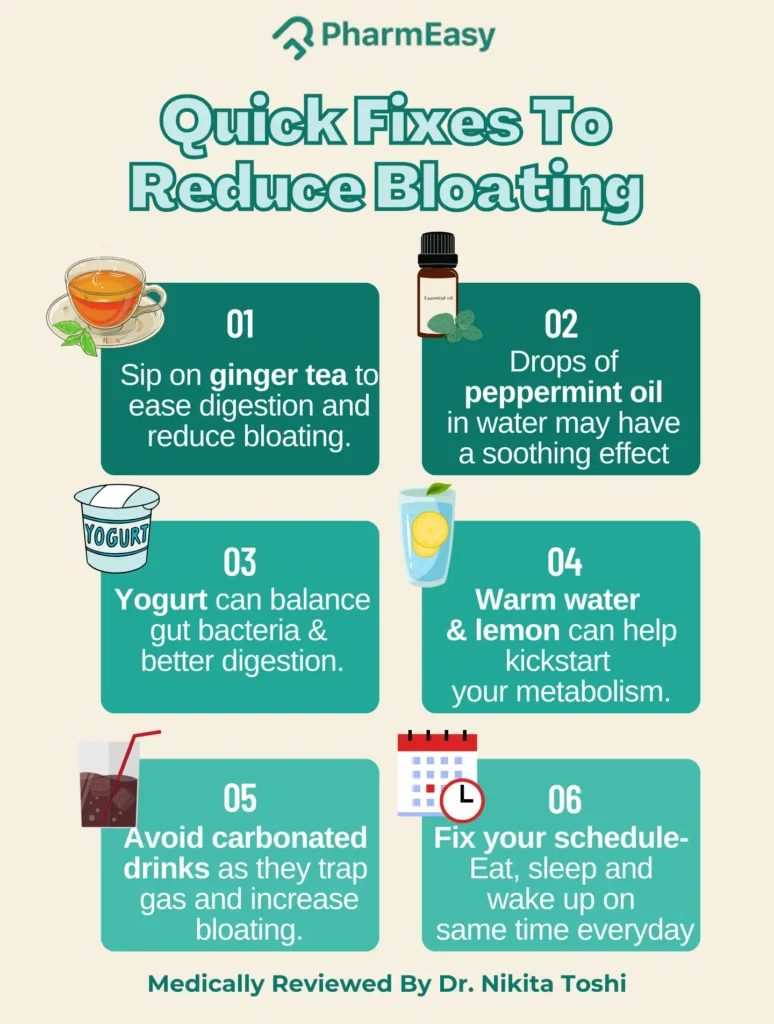
The following are some of the home remedies that may help you relieve bloating:
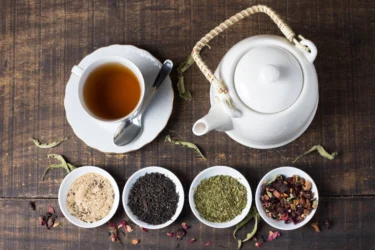
Herbal teas may aid in digestion and relieve gas. Some of the herbal teas that might benefit you for bloating are chamomile, peppermint, turmeric, ginger, and fennel tea. Dandelion tea may help to relieve water retention, thereby reducing bloating2.

According to Ayurveda, pan is a post-meal digestive stimulant4. You can chew betel leaves after meals; this can help with digestion. It may stimulate the secretion of digestive juices, relieve constipation and aid in reducing stomach bloating5.
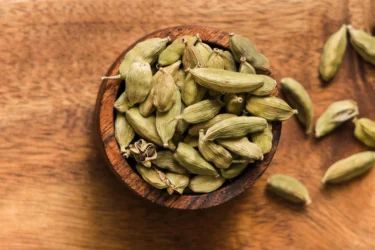
Traditionally, cardamom was used as a stomachic (helps digestion and promotes appetite), anti-flatulent (prevents gas accumulation) and for managing indigestion6. You can take some cardamom, shunti (dry ginger), and rock salt and make a fine powder of it. You can take this with warm water. This might be helpful in bloating and indigestion5.
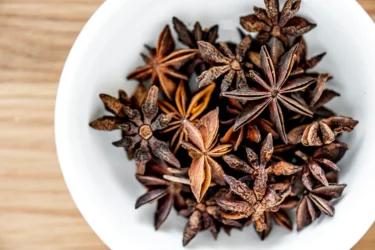
The star anise fruit acts as a carminative (to relieve gas from the intestine) and is used for indigestion and to relieve bloating7. You can take some anise powder and mix it with honey. It helps with digestive issues like bloating, flatulence, stomach pain, and colic (abdomen pain)5. The fruits of this tree are also used for making tea and might be helpful in stomach bloating and indigestion.
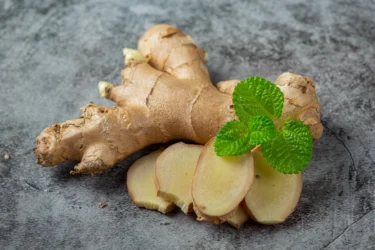
Ginger is an essential dietary agent that has carminative properties. It has been used for a long time to manage digestive issues like bloating, constipation, indigestion, discomfort, etc8. You can prepare ginger tea by adding ginger to the water and boiling it. This may help manage stomach bloating.
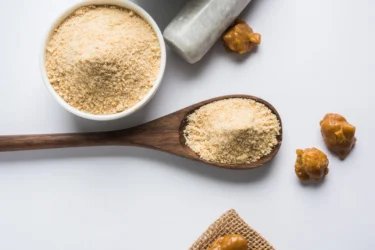
Hing is a popular ingredient in several foods. Its health benefits are that it helps to reduce bloating, menstrual pain, and indigestion9. You can take warm water with some hing in it. This may help with bloating.
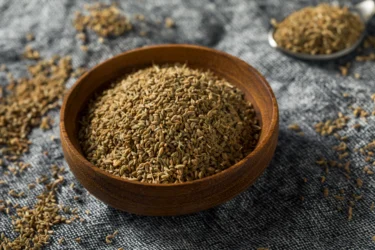
In Iran, ajwain has been used as an herbal remedy for a variety of gastrointestinal conditions, including bloating. It also has anti-inflammatory properties that also might be beneficial for bloating10. You can chew some ajwain seeds. You can also boil some ajwain in water, allow it to cool and then drink it.
Also Read: Natural Home Remedies For Constipation By Dr. Siddharth Gupta
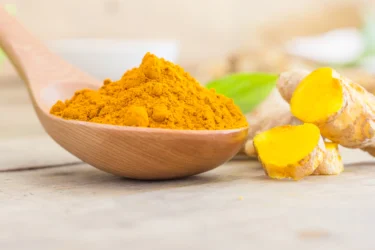
Turmeric is considered one of nature’s most potent healing agents. It acts as a digestive stimulant as well as a carminative. It is added to a variety of dishes to improve digestion and reduce gas and bloating. You can take turmeric as a dry powder mixed in plain water or buttermilk, which is highly beneficial for stomach issues11.
It is essential to educate patients on the benign course of this disorder, to establish long-term care and expectations for treatment. If red flag signs like unintentional weight loss, persistent vomiting, or dysphagia are present, further evaluation is recommended.
Dr. M.G. Kartheeka, MBBS MD(Pediatrics)
For more tips to reduce bloating CLICK HERE
Also Read: Natural Home Remedies for Loose Motion
Seek medical help if your stomach bloating:
You must also seek medical help if you notice other symptoms along with bloating, like:
Also Read: Natural Laxatives: Your Guide to Safe and Effective Remedies for Constipation
Bloating is a common experience and a very unpleasant feeling. However, it can be managed using some of the above-mentioned tips that may help to prevent stomach bloating from worsening. Additionally, home remedies such as herbal teas, elaichi, pan, star anise, ginger, hing, ajwain, and turmeric may be beneficial in reducing bloating. However, if the bloating persists for more than a week and you have other symptoms, which are worsening your condition, then in such cases, you must consult your doctor.
Also Read: 5 Instant Home Remedies For Gastric Problem
Yes, turmeric is an excellent healing agent and acts as a carminative and digestive stimulant. You can mix turmeric powder in plain water or buttermilk; this helps manage bloating11.
If you have been experiencing stomach bloating for more than a week, you must seek medical help2. There could be some condition that is causing the bloating. Your doctor will examine you properly and will suggest you the treatment accordingly.
Yes, herbal teas may help you to get rid of bloating. Herbal tea includes chamomile, peppermint, turmeric, ginger, and fennel. Even dandelion tea may help relieve bloating caused by water retention2.
Yes, ajwain has been used as a herbal remedy for various gastrointestinal conditions, including bloating. It has anti-inflammatory properties as well10. You can chew some ajwain seeds and boil some ajwain in water, allow it to cool and then drink it.
Yes, hing has several health benefits and also helps in reducing bloating9. You can mix some hing in warm water and drink it. This could help you manage your bloating problem.
1. Abdominal bloating. [Internet]. MedlinePlus National Library of Medicine. 2022. Available from: https://medlineplus.gov/ency/article/003123.htm
2. Bloated Stomach [Internet]. Cleveland Clinic. 2021. p. 1–13. Available from: https://my.clevelandclinic.org/health/symptoms/21740-bloated-stomach
3. Bloating [Internet]. American Academy of Family Physicians. 2021. p. 1–4. Available from: https://familydoctor.org/condition/bloating/
4. Toprani R, Patel D. Betel leaf: Revisiting the benefits of an ancient Indian herb. South Asian J Cancer. 2013 Jul-Sep;2(3):140–141. doi: 10.4103/2278-330X.114120. PMCID: PMC3892533. PMID: 24455591. Available from: https://pmc.ncbi.nlm.nih.gov/articles/PMC3892533/
5. AYUSH. Ayurveda Offering Herbal Healing [Internet]. 1–128 p. Available from: https://agritech.tnau.ac.in/horticulture/pdf/Aayush_AyurvedaOffering_HerbalHealing.pdf
6. Sengottuvelu S. Cardamom (Elettaria cardamomum Linn: Maton) Seeds in Health [Internet]. Nuts and Seeds in Health and Disease Prevention. Elsevier Inc.; 2011. 285–291 p. Available from: https://www.researchgate.net/publication/286335251_Cardamom_Elettaria_cardamomum_Linn_Maton_Seeds_in_Health
7. Gonzalez-Stuart AE, McCallum RW. Medicinal Plants Used for Digestive Disorders- What the Gastroenterologist Needs to Know. Pract Gastroenterol [Internet]. 2015;39(9):12–25. Available from: https://practicalgastro.com/wp-content/uploads/2019/11/Medicinal-Plants-for-Digestive-Disorders-What-Gastroenterologist-Needs-to-Know.pdf
8. Nikkhah Bodagh M, Maleki I, Hekmatdoost A. Ginger in gastrointestinal disorders: A systematic review of clinical trials. Food Sci Nutr [Internet]. 2019 Jan 1 [cited 2022 Mar 25];7(1):96. Available from: https://www.ncbi.nlm.nih.gov/pmc/articles/PMC6341159/
9. Shahrajabian MH, Sun W, Cheng Q. Asafoetida, Natural Medicine for Future. Curr Nutr Food Sci [Internet]. 2021;17(9):922–6. Available from: https://www.ingentaconnect.com/content/ben/cnf/2021/00000017/00000009/art00005
10. Yazdian M, Agah S, Minaii B, Ansari R, Hosseini H, Vazifekhah S, et al. Evaluation of Efficacy of Carum Copticum on Gaseous Symptoms in Patients With Abdominal Bloating. Int J Biosci [Internet]. 2014;5(9):372–8. Available from: https://www.cabidigitallibrary.org/doi/full/10.5555/20153063575
11. Bhowmik D, Chiranjib, Kumar KPS, Chandira M, B. Jayakar. Turmeric: A Herbal and Traditional Medicine. Sch Res Libr [Internet]. 2009;1(2):86–108. Available from: https://www.researchgate.net/profile/Debjit-Bhowmik-3/publication/268268687_Turmeric_A_Herbal_and_Traditional_Medicine/links/5552dedf08aeaaff3bf001f1/Turmeric-A-Herbal-and-Traditional-Medicine.pdf
Disclaimer: The information provided here is for educational/awareness purposes only and is not intended to be a substitute for medical treatment by a healthcare professional and should not be relied upon to diagnose or treat any medical condition. The reader should consult a registered medical practitioner to determine the appropriateness of the information and before consuming any medication. PharmEasy does not provide any guarantee or warranty (express or implied) regarding the accuracy, adequacy, completeness, legality, reliability or usefulness of the information; and disclaims any liability arising thereof.
Links and product recommendations in the information provided here are advertisements of third-party products available on the website. PharmEasy does not make any representation on the accuracy or suitability of such products/services. Advertisements do not influence the editorial decisions or content. The information in this blog is subject to change without notice. The authors and administrators reserve the right to modify, add, or remove content without notification. It is your responsibility to review this disclaimer regularly for any changes.
We have all experienced a red, itchy eye at some point in our lives. A red eye is generally used to describe irritated, red, and bloodshot eyes. Eye redness can be painful and extremely uncomfortable. A red eye is the first sign of eye inflammation1. Red eyes may be relatively harmless and can easily improve with home remedies. However, if the red eye is accompanied by swelling, eye pain, light sensitivity, or blurry vision, you must immediately seek medical help. A red eye is the result of a reaction to something that irritates your eye. It can affect one or both eyes and might appear suddenly or progress with time; it can be due to eye injury or an allergic reaction to some foreign substance that entered your eyes2.
Red eyes can occur due to several reasons. Sometimes, they can occur even due to daily habits like staring at your computer screen for too long without any break or wearing contact lenses for a prolonged hours. Other causes of red eyes include the following underlying conditions:
Red eyes is a common symptom but Eye infection and foreign body should be ruled out by consulting an Ophthalmologist.
Dr. M.G. Kartheeka, MBBS, MD(Pediatrics)
Redness of eyes is itself a symptom as a result of some irritation. Signs and symptoms that may accompany a red eye include:
Red eyes are very common and can be caused by allergies, viral infections, or dry eyes. But sometimes they are the result of more serious conditions that need medical attention. If they persist with a change in vision, consult your ophthalmologist.
Dr. Ashish Bajaj, M.B.B.S., M.D. in Clinical Pharmacology and Toxicology
There are various home remedies for red eyes that you can use before rushing to a doctor. Sometimes gently washing the eyes, resting them, lightly massaging the eyelids, or using a compress for closed eyes might be enough to settle redness of eyes2. Here are some hacks that you can use as home remedies for red eyes:

A warm compress might be beneficial for a red eye1. You can place a damp, warm cloth over your eyes for a few mins. For this, soak a clean cloth in warm water and remove all the excess water from the cloth. Then place this damp cloth over your eyes and let it rest until the cloth becomes cool3.

Placing a cold compress over closed eyelids might be beneficial to lessen eye redness2. You can soak a cloth in cold water and apply it gently over your eyes. You can also freeze a wet cloth and gently apply it over your eyes till it gets warm. The cold water reduce the inflammation along with providing a cooling effect.

Take a few fresh leaves of punarnava and grind them into a fine paste. Now, apply this paste over closed eyes. This gives a cooling effect to the eyes4, and may be beneficial for reducing the inflammation and redness of eyes.
When we work on the computer screen for too long, our blinking rate tends to decrease. That results in eye dryness that could manifest as red, fatigued eyes. Therefore I always recommend computer professionals to take frequent screen breaks.
Dr. Gitanjali Sharma Bose, MBBS, MS Ophthalmology
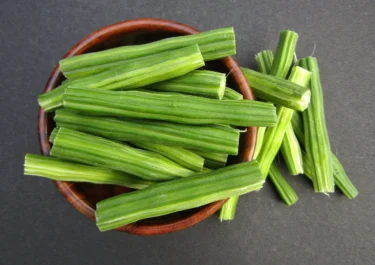
The leaves of the drumstick tree are mainly used for cooking and medicinal purposes, as they are rich in antioxidants and other nutrients. The tree has anti-inflammatory properties and may be beneficial in eye problems5. You can take the leaves of the drumstick tree and grind them to make a fine paste. You can apply this paste around closed eyes4. The anti-inflammatory properties of drumstick might be beneficial to alleviate the redness.

Aparijita, also called butterfly pea, is widely used as a medicinal plant in Indonesia. It is believed to have beneficial effects on health, particularly in conjunctivitis. It contains anthocyanins (flavonoid pigment found in plants) that might be a potential antibacterial agent6. Also, the tree has anti-inflammatory properties7, which might help reduce inflammation. You can smash aparajita flowers with cow milk. Apply this paste over closed eyes4. The anti-bacterial and anti-inflammatory properties might help quickly overcome an eye infection and lower the inflammation.
You can also try these to get rid of a red eye:
If redness is accompanied by pain, watering or photophobia, one must avoid self- treating it and immediately consult an ophthalmologist.
Dr. Gitanjali Sharma Bose, MBBS, MS Ophthalmology
Also Read: Simple Home Remedies For Puffy Eyes
You must seek medical help when you:
Also Read: Effective Home Remedies for Body Pain
Inflammation of the eye is the cause of a red eye. The eye inflammation may be relieved using some common home remedies easily available in your kitchen or garden compound. You can use home remedies like warm and cold compresses, or a paste of punarnava, shigru, and aparijita. These home remedies might help you get rid of red eyes. However, it is advisable to consult your doctor if the redness lasts beyond 1 or 2 days, or new symptoms develop.
Also Read: Natural Home Remedies for Food Poisoning
Red eyes can occur due to several reasons; it can be the smallest cause (contact lenses) to some severe conditions (blepharitis, allergies, dry eyes, glaucoma, conjunctivitis, eye injury). It can also be caused due to whitening eye drops, excessive alcohol use, or smoking2.
Red eyes can occur due to several reasons, some serious, but most of them are nothing to be alarmed about. If the symptoms continue for more than 1 to 2 days, you must seek medical help and get an accurate diagnosis8.
If the redness does not alleviate within 1-2 days8, you must seek medical help from a general phyisician or an ophthalmologist, who is a specialist eye doctor, as there might be some underlying medical condition responsible for the redness of your eyes.
Yes, you can use a warm compress for red eyes1. For this, soak a clean washcloth in warm water, remove all the excess water from the cloth, lay this damp cloth over your eyes, and let it rest3.
Yes, a cold compress may be used to relieve the redness in your eye2. You can soak a cloth in cold water or freeze a wet cloth and gently apply it over your eyes.
Home remedies for subsiding the redness in the eyes include warm or cold compresses, paste of punarnava leaves, or shigru leaves, or aparijita flower with cow milk1,7.
If you experience red eyes for more than 1-2 days, along with symptoms like nausea and vomiting, headache with confusion or blurred vision, rings around lights, an eye injury, have vision changes, eye pain, sensitivity to light, greenish or yellowish discharge from your eye, or any foreign body in your eye8, you must immediately seek medical help.
Yes, there are chances that the redness in your eye is due to a contact lens3. Avoid using contact lenses for too long and consult your doctor if the redness doesn’t settle in a 1-2 hours.
1. Cronau H, Kankanala RR, Mauger T. Diagnosis and management of red eye in primary care. Am Fam Physician. 2010;81(2):137–44. Available at: https://pubmed.ncbi.nlm.nih.gov/20082509/
2. Red Eye [Internet]. Cleveland Clinic. 2018. p. 1–9. Available from: https://my.clevelandclinic.org/health/symptoms/17690-red-eye
3. Gudgel dan T. Pink Eye Home Remedies [Internet]. American Academy of Opthalmology. 2021. Available from: https://www.aao.org/eye-health/diseases/pink-eye-quick-home-remedies
4. AYUSH. Ayurveda Offering Herbal Healing [Internet]. 1–128 p. Available from: https://agritech.tnau.ac.in/horticulture/pdf/Aayush_AyurvedaOffering_HerbalHealing.pdf
5. Vergara-Jimenez M, Almatrafi MM, Fernandez ML. Bioactive components in Moringa oleifera leaves protect against chronic disease. Antioxidants. 2017;6(4):1–13. Available at: https://www.ncbi.nlm.nih.gov/pmc/articles/PMC5745501/
6. Anthika B, Kusumocahyo SP, Sutanto H. Ultrasonic Approach in Clitoria ternatea (Butterfly Pea) Extraction in Water and Extract Sterilization by Ultrafiltration for Eye Drop Active Ingredient. Procedia Chem. 2015;16(6):237–44. Available from: https://www.researchgate.net/publication/289998595_Ultrasonic_Approach_in_Clitoria_ternatea_Butterfly_Pea_Extraction_in_Water_and_Extract_Sterilization_by_Ultrafiltration_for_Eye_Drop_Active_Ingredient
7. Mukherjee PK, Kumar V, Kumar NS, Heinrich M. The Ayurvedic medicine Clitoria ternatea-From traditional use to scientific assessment. J Ethnopharmacol. 2008;120(3):291–301. Available at: https://pubmed.ncbi.nlm.nih.gov/18926895/
8. Eye Redness [Internet]. MedlinePlus Medical Encyclopedia. 2020. p. 1–4. Available from: https://medlineplus.gov/ency/article/003031.htm
Disclaimer: The information provided here is for educational/awareness purposes only and is not intended to be a substitute for medical treatment by a healthcare professional and should not be relied upon to diagnose or treat any medical condition. The reader should consult a registered medical practitioner to determine the appropriateness of the information and before consuming any medication. PharmEasy does not provide any guarantee or warranty (express or implied) regarding the accuracy, adequacy, completeness, legality, reliability or usefulness of the information; and disclaims any liability arising thereof.
Links and product recommendations in the information provided here are advertisements of third-party products available on the website. PharmEasy does not make any representation on the accuracy or suitability of such products/services. Advertisements do not influence the editorial decisions or content. The information in this blog is subject to change without notice. The authors and administrators reserve the right to modify, add, or remove content without notification. It is your responsibility to review this disclaimer regularly for any changes.
Ayurvedic medicines are widely used in India, Nepal, Bangladesh, Pakistan, Sri Lanka, and Bhutan. Amritarishta is an Ayurvedic formulation. The ingredients in amritarishta include amrita, patala, bilva, gambhari, shyonaka, agnimanta, bruhati, prashniparni, shaliparni, kantakari, jala, gokshura, jaggery, jeeraka, nagara, parpata, katuki, ativisha, saptaparna, pippali, maricha, and self-generated alcohol1. It contains 5 to 8% of self-generated natural alcohol. It also has water that may help in absorption and proper digestion and may boost natural immunity2. The main ingredient in amritarishta is the dried stem of amrita/guduchi (Tinospora cordifolia)3. Amritarishta may have some effects on arthritis, gouty arthritis, fever, rheumatic fever, viral fever, auto-immune disorders, and skin disorders1.
Did you know?
The chemical constituents of amritarishta include alkaloids, steroids, and a high amount of phenolic compounds3.
Amritarishta may have the following beneficial properties:
Some of the potential uses of amritarishta are described as follows:

A study6 by Tiwari et al., 2014, was conducted where amritarishta was tested for its blood sugar-lowering activity in animals. The results showed that it significantly lowered the fasting blood glucose (FBG) and low-density lipoprotein (LDL) levels (bad cholesterol), , and triglycerides (fats) levels and elevated the high-density lipoprotein (HDL) level (good cholesterol). This result suggests that amritarishta might help lower the blood sugar levels. However, this study is insufficient and requires more studies to support the potential use of amritarishta for decreasing blood sugar levels in the body. Diabetes is a very serious condition; therefore, doctors’ consultation is necessary before taking amritarishta for managing blood sugar levels in the body.

High triglyceride (fats) and cholesterol levels in the blood may be linked to heart-related diseases. In a study conducted in 2013, amritarishta was found to lower cholesterol, triglyceride, and LDL (low-density lipoprotein) level and increase the HDL level. It significantly lowered the atherogenic level (reflects the triglyceride and HDL cholesterol). These results suggest that amritarishta may have anti-atherosclerotic (reduces the fats deposition in arteries) activity that might be beneficial for managing heart-related diseases3. This information is insufficient and require more human trials to suggest the uses of amritarishta. Therefore, people should speak to their concerned doctors and only have amritarishta if prescribed.

The dried stem of amrita is the main ingredient in amritarishta3. In traditional medicine, amrita with ginger has been used to manage rheumatoid arthritis. The extract of amrita has been stated to increase the joint cartilage thickness in animal studies. It was also reported to relieve osteoporosis (a condition where the bones become weak and brittle) in animals. Therefore, amrita might be helpful in dealing with osteoarthritis and osteoporosis. However, these claims are related to animals and not to humans. Therefore, amritarishta needs large-scale human trials to support its potential uses for osteoporosis and arthritis.

In a study8, the amrita extracts reduced anxiety (caused due to sleep deprivation) and other mood disorders in animals. Also, the herb amrita may have antioxidant properties that might enhance the weakened age-related cognitive (related to thinking, remembering, and reasoning) function, including intellectual decline, memory loss, and change in behavior and personality. However, this information is insufficient and more studies are required to suggest the benefits of amritarishta for mental conditions. People should never use any herbal preparations to self-medicate themselves.
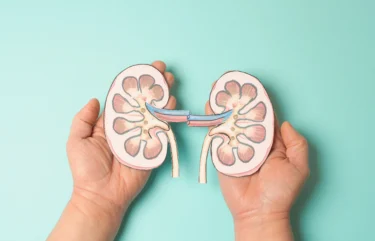
The herb amrita may relieve nephrotic syndrome (the body excretes too much protein in the urine) due to its antioxidant, anti-inflammatory, and immunomodulatory activity. Nephrotic syndrome is a kidney disease mostly occurring in children. The amrita extract may have benefits in managing kidney diseases like nephrotic syndrome and urinary tract infections caused by Klebsiella, E. coli, and other gram-negative microbes. You must consult a qualified doctor for proper advice on kidney-related diseases.
Although studies show the benefits of amritarishta in different health conditions, this information is insufficient. Hence, there is a need for further studies to establish the true extent of the benefits of amritarishta on human health. Furthermore, every person may respond differently to these herbs. Therefore, it is important to consult a doctor before using amritarishta for any medical condition.
Based on my experience, I highly recommend considering Amritarishta, a polyherbal Ayurvedic medicine that has been traditionally used for various ailments. Recent studies have shown that this medicine might exhibit remarkable hepatoprotective properties, meaning it can help protect and support the health of the liver9.
Dr. Siddharth Gupta, B.A.M.S, M.D (Ayu)
Amritarishta can be taken with water after food2.
However, it is advisable to consult your doctor before taking amritarishta. Your doctor will examine you thoroughly and advise you on the dose and form accordingly. In addition, we recommend you do not replace or discontinue your ongoing medications with any ayurvedic or herbal preparations without seeking the medical advice of a doctor.
Also Read: Prabhakar Vati: Uses, Benefits, Side Effects, and more!
There is no sufficient scientific information on the side effects of amritarishta in humans. But if you notice any side effects after taking amritarishta, you must notify your doctor. They will be the best person to provide appropriate treatment for any side effects.
I would recommend considering Amritarishta, an Ayurvedic medicine that has been traditionally used for Vatasanshman karma (alleviating Vata dosha), Brihangan karma (promoting proper digestion), and specifically for conditions like Kamala (Jaundice) and Pandu (anaemia). The combination of various herbs in Amritarishta is believed to have synergistic effects, working together to balance Vata, improve digestion, and address specific conditions like Jaundice and anaemia.
Dr. Rajeev Singh, BAMS
Before consulting, people should never use amritarishta or any other herb to self-medicate themselves.
Also Read: Paneer Dodi: Uses, Benefits & Side Effects
There is no sufficient information on the interaction of amritarishta with any medicine. Therefore, if you are on any medication and want to take amritarishta, you must consult your doctor as they would guide you best on this.
Also Read: Kantakari: Uses, Benefits & Side Effects
You should always consult your doctor before taking any Ayurvedic preparation. They will guide you properly regarding the dosage and how long you can take amritarishta.
Amritarishta may be good for diabetes. In a study conducted on animals, amritarishta lowered the FBG along with cholesterol, triglyceride, and LDL levels and increased the HDL levels. The lowered FBG suggested that it might be beneficial for diabetes6. However, human studies are required to confirm the blood glucose-lowering activity of amritarishta in humans. Diabetes is a serious health condition and needs proper diagnosis. And only use it if prescribed by doctors.
Amritarishta might be useful for dealing with fever, viral fever, rheumatic fever, arthritis, gouty arthritis, auto-immune disorders, and skin disorders1.
Amritarishta might be beneficial to the heart. In a study3 (Tiwari et al., 2014), amritarishta reduced triglyceride, cholesterol, and LDL level and elevated the HDL level. This might be useful for managing heart-related diseases. However, this information needs scientific support and more studies on humans are also required to suggest the uses of amritarishta for heart health.
It is advisable to consult your doctor before taking amritarishta. You can describe your condition/problems to them, and accordingly, they will prescribe you the form and dosage.
There is not enough data available on the side effects of amritarishta, but if you notice any symptoms, you must immediately consult your doctor.
The dried stem of amrita, also called guduchi, is the main ingredient in amritarishta3.
It is better to avoid taking amritarishta during pregnancy as there is not enough information available on its safe usage during pregnancy.
There is no sufficient information available on the interaction of amritarishta with any medicine. Therefore, it is advisable to consult an Ayurvedic practitioner before taking amritarishta.
Disclaimer: The information provided here is for educational/awareness purposes only and is not intended to be a substitute for medical treatment by a healthcare professional and should not be relied upon to diagnose or treat any medical condition. The reader should consult a registered medical practitioner to determine the appropriateness of the information and before consuming any medication. PharmEasy does not provide any guarantee or warranty (express or implied) regarding the accuracy, adequacy, completeness, legality, reliability or usefulness of the information; and disclaims any liability arising thereof.
Links and product recommendations in the information provided here are advertisements of third-party products available on the website. PharmEasy does not make any representation on the accuracy or suitability of such products/services. Advertisements do not influence the editorial decisions or content. The information in this blog is subject to change without notice. The authors and administrators reserve the right to modify, add, or remove content without notification. It is your responsibility to review this disclaimer regularly for any changes.
Acidity can hit at the most inconvenient times, leaving you with a burning sensation in your chest and discomfort. While occasional acidity is normal, frequent episodes can disturb your day-to-day life.
You don’t always need to reach for over-the-counter antacids. Here are some simple home remedies that can help relieve acidity and restore comfort.
Friendly Reminder: The information shared here is for educational purposes only, and the reader should consult a registered medical practitioner before implementing any changes to their health routine.
Acidity is often confused with other conditions. Here is a quick guide to understanding these terms better:
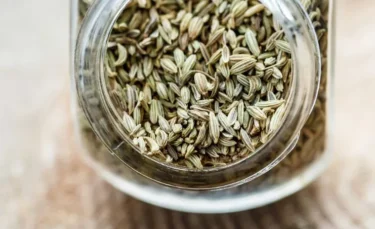
Fennel water may help ease acidity and related symptoms like heartburn and bloating while improving digestion.
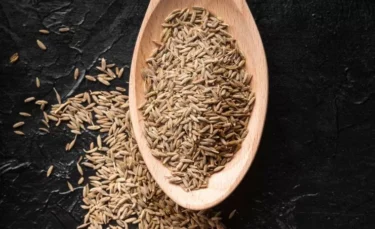
Chew cumin seeds directly or boil one teaspoon of them in a glass of water and drink it to relieve acidity. Black cumin seeds are gastro-protective. They are effective in reducing and preventing acidity and its symptoms like heartburn, pain, nausea, bloating, constipation, etc[5].
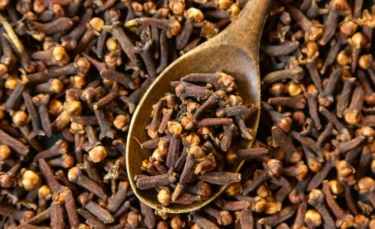
Chew and suck a piece of clove to get rid of acidity and its symptoms like flatulence, indigestion, nausea, gastric irritability, etc.

Drinking a glass of lukewarm water on an empty stomach and before sleeping at night may support digestion and relieve acidity.

A glass of watermelon juice is effective in relieving acidity and is suitable for digestion as well[6].
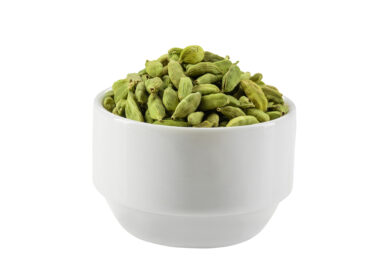
Chewing one cardamom pod every day helps reduce the chances of acidity and flatulence and also improves digestion.

Apple cider vinegar contains proteins, enzymes and pectin, making it a highly nutritious addition to your diet. Some people claim that reduced amounts of stomach acid may cause acid reflux, and this vinegar can introduce more acid into the system. However, it is advisable to consult a doctor before consuming it.
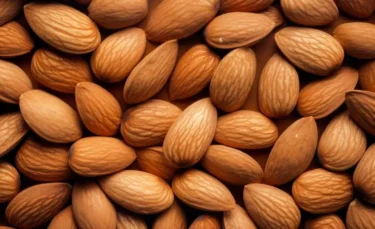
Almonds are rich in nutrients and fibre, which may help reduce the risk of heartburn and absorb acid. Though there is no substantial clinical evidence for the same. Acidity issues are linked to appetite and diet. Almonds can help regulate these factors due to their high nutritional value.
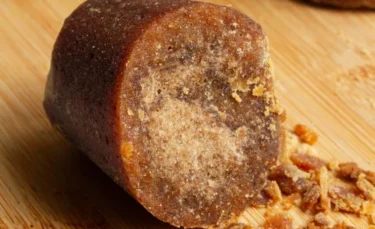
Jaggery contains potassium and magnesium. Potassium is essential for maintaining pH balance and stimulating mucous production in the stomach lining. This prevents an acid overload and helps relieve your symptoms. Magnesium is required to keep your digestive system strong and functioning normally, which reduces the risk of acidity and other digestive issues.
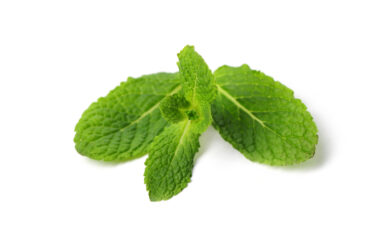
Mint leaves not only aid in digestion but also bring a cooling effect to your body. Mint leaves are a simple yet effective solution against acidity for temporary relief and long-term support against acid reflux.
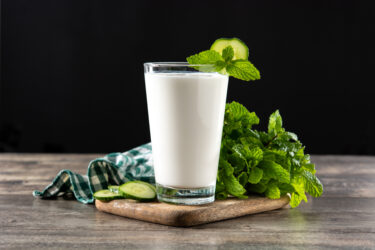
The lactic acid in buttermilk normalises the acidity in the stomach and gives a soothing effect. A glass of buttermilk topped with black pepper and coriander may help ease the symptoms of acidity.
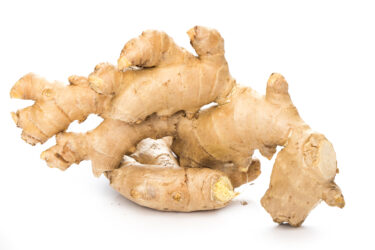
Chewing raw ginger or drinking ginger tea can prevent acidity and aid digestion. Ginger[11] stimulates digestive juices, helping break down food and preventing excess stomach acid. Its anti-inflammatory properties also soothe the digestive system, reducing discomfort from acidity.

Bananas are effective in neutralising acidity and alleviating heartburn. Combining bananas with milk can further help suppress excessive acid production, relieving digestive issues. This natural remedy provides soothing effects and promotes digestive comfort.
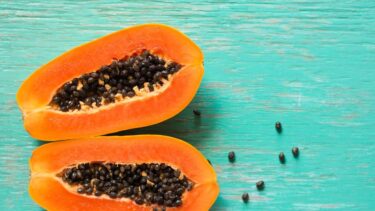
Papaya is beneficial for reducing gastric acid secretion and easing acidity due to its natural enzyme, papain[12]. Papain assists digestion by breaking down proteins and supporting a more balanced pH in the stomach. This enzyme’s properties contribute to relieving symptoms associated with acidity, making papaya a natural remedy for digestive discomfort.
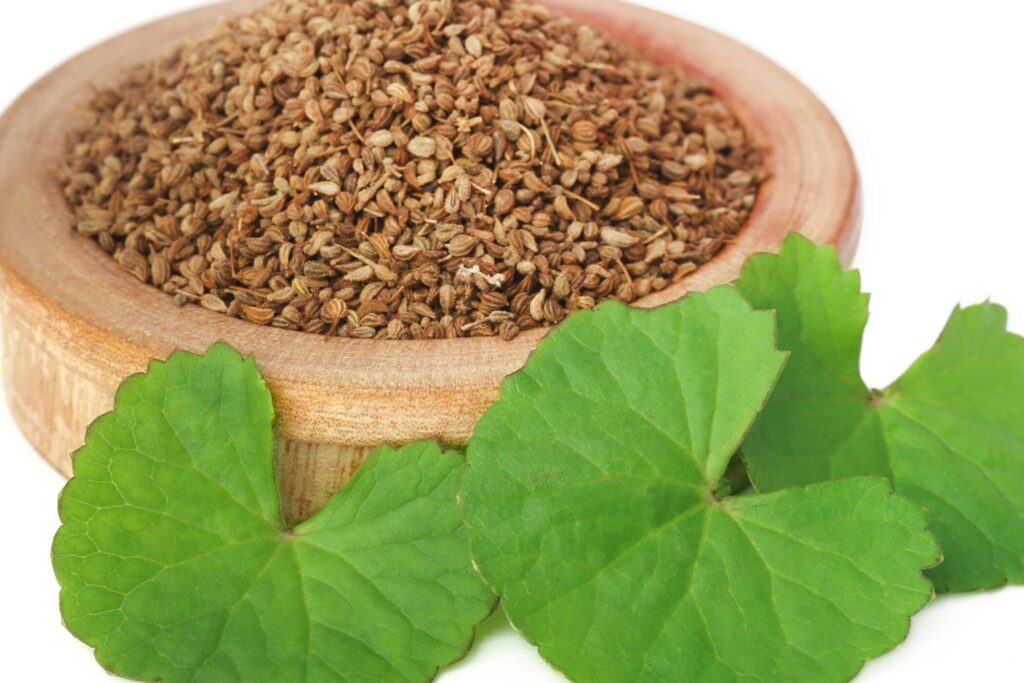
Consuming ajwain provides relief from acidity and flatulence. It is renowned for its digestive benefits and is an effective anti-acidic agent. Ajwain helps soothe the stomach and alleviate discomfort associated with acidity.
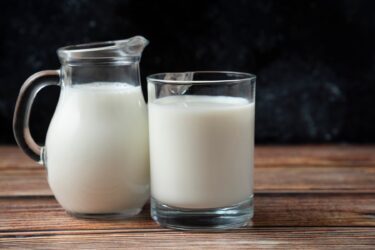
Drinking a glass of cold milk provides instant relief from acidity. The milk helps neutralise excess stomach acid, reducing the burning sensation and discomfort associated with acidity quickly and effectively[2] .
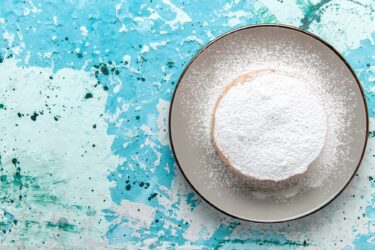
Mixing 1/2 teaspoon of baking soda in 1/2 cup of water offers rapid relief from acidity and heartburn. Baking soda, or sodium bicarbonate, neutralises stomach acid, easing the discomfort caused by acid reflux and heartburn[2].
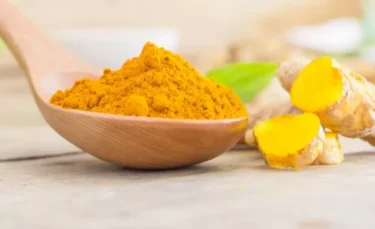
Turmeric contains curcumin, anti-inflammatory properties that can soothe the digestive system and reduce irritation caused by excess stomach acid[8]. Integrating turmeric into meals or consuming it as a supplement can be beneficial for managing acidity and related symptoms.

If food-based remedies don’t work, you can try non-food methods like sleeping on your left side. This position helps keep stomach acid below the oesophagus, reducing the risk of acid reflux. However, sleeping on your right side can make acid reflux more likely as stomach acid may reach the sphincter[9].

Some studies[3] show that chewing on gum may help reduce the acidity as the bicarbonate in it can help neutralise the acid to prevent reflux. More substantial research is required to support this finding, but chewing gum can also create more saliva, which can help clear the oesophagus.

Elevating the head of your bed can help reduce symptoms of acidity. Research[10] indicates that people who used a wedge to support and elevate their upper body may experience less acid reflux than those who slept flat. This is another effective home remedy that may provide relief.
Also Read: Causes Behind Recurring Stomach Pain
Also Read: Simple Home Remedies For Pinworms
Acidity symptoms can have a huge impact on your sleep and day-to-day activities. If you frequently experience these symptoms, it’s advisable to consult a doctor to understand the underlying reasons. A proper diagnosis, timely treatment, and home remedies can be helpful in managing acidity. Don’t ignore symptoms for a longer period, which can lead to more serious complications.
Also Read: Natural Home Remedies for Food Poisoning
You may consume antacids to get quick and effective relief from acidity symptoms. However, consult a doctor to understand how and when to consume them.
A sedentary lifestyle and unhealthy eating habits can cause acidity frequently.
If you experience severe heartburn or gastroesophageal reflux disease (GERD) often, you must consult a doctor. In case you are having difficulty swallowing or are taking pills for acidity every day and no home remedies are working for you, it’s time to seek medical help.
A gastroenterologist will be able to help you in relieving the symptoms and providing treatment for acidity. If a gastroenterologist is unavailable in your city, consult a general physician, but do not self-medicate or ignore the symptoms.
Yes, acidity can cause chest pain when stomach acid irritates the lining of the oesophagus, a condition known as acid reflux or heartburn. This discomfort is typically felt in the chest area, often behind the breastbone, due to the proximity of the oesophagus to the heart.
Acidity typically does not cause neck pain directly. However, severe acid reflux or GERD (gastroesophageal reflux disease) may lead to discomfort that radiates upward, potentially causing a sensation of throat tightness or irritation, which can be mistaken for neck pain.
Lemon is acidic, but it can have an alkalising effect on the body once absorbed. However, consuming large amounts of lemon or highly concentrated lemon juice may worsen acidity in individuals prone to acid reflux or GERD due to its acidic pH, potentially triggering symptoms in sensitive individuals.
Acidity can be a trigger for people with migraines. Severe acid reflux or GERD can lead to discomfort and disrupted sleep patterns, which may indirectly contribute to headaches in some individuals. Additionally, stress and anxiety often associated with acid reflux can also trigger tension headaches.
Acidity and pitta are related concepts in Ayurveda, where pitta is one of the three doshas (bioenergies) governing bodily functions. Pitta dosha, when aggravated, can lead to symptoms like heartburn, acid reflux, and acidity. Thus, while they differ, an imbalance in pitta dosha can contribute to acidity and related digestive issues.
Yes, curd (yoghurt) is often considered beneficial for managing acidity. It contains probiotics that can help maintain a healthy balance of gut bacteria, aiding digestion and reducing symptoms of acid reflux. However, individual tolerance may vary, and some people with severe acid reflux or lactose intolerance may find curd worsen their symptoms.
Yes, coconut water is generally considered suitable for acidity. It is alkaline and can help neutralise excess stomach acid, relieving symptoms like heartburn and acid reflux. Additionally, coconut water is hydrating and contains electrolytes, supporting digestive health. However, as with any food or beverage, individual responses may vary, so observing how your body reacts to coconut water is advisable.
Ice cream may worsen acidity for some individuals due to its high fat content, which can relax the lower oesophagal sphincter and allow acid to reflux into the oesophagus. Therefore, moderation is advised for those prone to acidity.
In common usage, “acidity” and “acid reflux” are often used interchangeably to refer to the same condition where stomach acid flows back up into the oesophagus, causing discomfort or pain. However, acidity can also refer more broadly to the level of acid in the stomach, while acid reflux describes specifically the movement of that acid upwards.
Disclaimer: The information provided here is for educational/awareness purposes only and is not intended to be a substitute for medical treatment by a healthcare professional and should not be relied upon to diagnose or treat any medical condition. The reader should consult a registered medical practitioner to determine the appropriateness of the information and before consuming any medication. PharmEasy does not provide any guarantee or warranty (express or implied) regarding the accuracy, adequacy, completeness, legality, reliability or usefulness of the information; and disclaims any liability arising thereof.
Hairstyle, colour, and length of hair play an essential role in people’s self-perception and physical appearance. Hair greying is one of the initial and most noticeable signs of human ageing. Hair greying, also known as canities, is a process of chronological ageing that affects people regardless of their gender or race. The term premature greying is used when greying occurs before the age of 20 in Caucasians, before 30 in Africans, and before 25 in Asians1.
Premature hair greying (PHG) or canities has a considerable detrimental impact on the affected individual’s appearance and self-esteem, considering the important function of hair in day-to-day social life. It is often thought of as a sign of old age and loss of health.
Did You Know?
Melanocytes are cells within each hair follicle that produce two basic pigments called pheomelanin or eumelanin, according to your DNA. Eumelanin is mostly present in brown and black hair, whereas pheomelanin is found in red and blond hair. The pigments produced in scalp hair degrade more slowly than the melanin that colours the skin. This allows the hair to maintain its colour as it grows for an average of 3.5 years2.
Grey hair develops as the number of melanocytes decreases. But the time when those cells begin to decrease varies from person to person. Here are some causes for hair greying:
Specific genes related to hair greying have been identified. One study3 identified the gene responsible for controlling, producing and storing melanin. It was found that those with PHG had a family history of PHG and had a genetic tendency to develop allergic diseases like asthma or eczema.
Individuals who are overweight or obese are more likely to develop grey hair4.
It was found in a study5 that smokers were at a higher risk of developing premature hair greying than nonsmokers. Although the mechanism behind this could not be found, it was suggested that smoking could increase oxidative stress, which can damage melanin-producing cells.
Stress can speed up the greying process. Stresses that are responsible for a fight-or-flight response might deplete the reserve of stem cells present in hair follicles that can be transformed into pigment cells when new hairs form6.
It was observed in a study7 that a deficiency of vitamin B12 can lead to PHG, which can be reversed when the vitamin is supplemented. Dairy products and meat are common natural sources of vitamin B12. This explains why a vegetarian diet could be a reason for developing PHG. It also might be difficult for older persons to absorb vitamin B12 through digestion.
According to a study1, it was found that diseases like vitiligo and alopecia areata can lead to premature greying. Vitiligo develops when cells that produce melanin stop functioning or die, causing loss of skin colour in patches over the body that commonly grow over time. In a few cases, it also leads to loss of hair colour. In alopecia areata, there can be a sudden loss of colour of hair, which might lead to more noticeable grey hair.
Other conditions that cause hair greying are:
Frequently, patients in their late 30s and 40s express concerns regarding premature greying. In such circumstances, counselling is necessary to educate them that greying is a distinctive aspect of ageing, and we must embrace it. In such instances, available safe colouring options can be considered since reversing natural hair colour may not be feasible.
Dr. Arpit Verma, MBBS MD (Pharmacology)
The average age of onset of premature hair greying ranges from 2 to 22 years, with the earliest age of onset being 2 years.
Certain remedies are known to stimulate pigmentation of hair. These preparations help restore the natural hair colour and may prevent further greying. Some remedies for dealing with grey hair are:
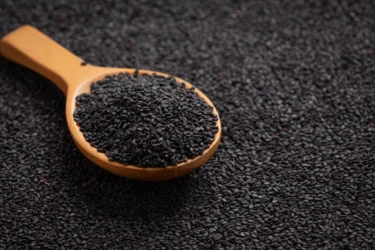
Sesame seeds, especially the black sesame, are known to blacken the hair9. Hence, they can be applied to white hair. Eating some black sesame seeds twice a week may help to slow down or even reverse the hair greying process.
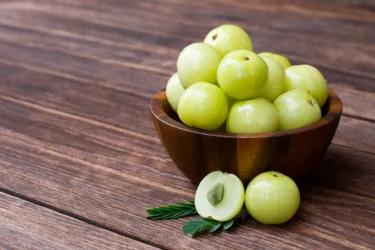
Amla enriches hair pigmentation. Dried fruit of amla and coconut oil can be boiled together till they get charred and used for hair greying. You can massage your hair with this amla oil and drink amla juice regularly to help control the premature greying of your hair.

Using curry leaves is considered beneficial in traditional practices for preventing greying. Curry leaves crushed into a paste when mixed with yoghurt can be applied on hair twice a week for potential benefits.
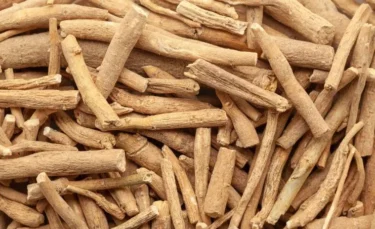
Ashwagandha is traditionally believed to improve blood circulation and help delay premature hair greying. Ashwagandha root powder, along with Brahmi powder, may be formed into a paste and used as a mask. This mask can be massaged on the scalp and washed later for benefits. Consuming ashwagandha tea may also be supportive.

Bhringraj (Eclipta alba) is traditionally known as a “king of herbs” for hair health10. Leaves of Bhringraj may be soaked in any oil overnight, and this oil may be applied to hair.

Hibiscus contains vitamins C and A and iron. Paste of its flower, along with any oil when applied to hair, may help in managing grey hair by blackening the hair.
Asking a dermatologist or trichology expert for assistance is the optimal approach to managing premature greying of hair, as identifying and tackling the root cause is crucial. Home remedies may not be universally successful in treating every case of greying.
Dr. Arpit Verma, MBBS MD (Pharmacology)
Also Read: Effective Home Remedies For Frizzy Hair
Early greying of hair can be treated by obtaining a proper diagnosis and treatment plan.
Also Read: Best Home Remedies for Hair Growth
Premature greying of hair can have a negative impact on young people’s self-esteem, particularly on those with darker hair types, due to the easy sight of grey hair. Therefore, long-lasting and efficient management of grey hair is essential. Today, there are several home remedies like oak galls, barley, onion juice, etc., that are known to be effective in dealing with grey hair.
Even with the proper understanding of the causes of grey hair, the exact reason for its premature onset is not well studied. Hence, satisfactory management for its reversal remains indescribable as of today.
Also Read: Home Remedies To Help Reduce Dandruff Naturally
The pigment called melanin, which gives colour to the skin and eyes, is also responsible for determining the hair’s colour. Hair colour is determined by the quality and combination of melanin.
Grey hair is melanin-depleted hair, whereas white hair is completely devoid of it. This is partly due to a decrease in the number of stem cells that mature into melanin-producing cells. The cells may become worn out, damaged, or lose the support systems that are responsible for keeping them functioning. Genes play a role in melanin production since they help regulate it. There are multiple causes for developing PHG, such as a poor diet, genes, vitamin deficiencies, obesity, smoking, stress and some diseases.
Natural and synthetic hair dyes or colours are available. Indian gooseberry, false daisy, and henna are popular natural colours that are usually safe to use but necessitate frequent touch-ups due to weak colourants. There are two types of synthetic hair dyes- oxidative (use an oxidising agent like hydrogen peroxide to produce hair colour) and non-oxidative (do not contain an oxidising agent)
Deficiencies in vitamins like B12, biotin, folic acid, and vitamin E may contribute to premature hair greying. A doctor can guide appropriate supplementation.
Compounds like calcium pantothenate, green tea extract, phytoestrogens, and para-aminobenzoic acid may be taken orally under a doctor’s guidance to manage grey hair.
Disclaimer: The information provided here is for educational/awareness purposes only and is not intended to be a substitute for medical treatment by a healthcare professional and should not be relied upon to diagnose or treat any medical condition. The reader should consult a registered medical practitioner to determine the appropriateness of the information and before consuming any medication. PharmEasy does not provide any guarantee or warranty (express or implied) regarding the accuracy, adequacy, completeness, legality, reliability or usefulness of the information; and disclaims any liability arising thereof.
Diabetes mellitus is a chronic condition caused by the lack of insulin in our bodies1. It affects the utilisation of sugar produced from the food we eat. Although positive life changes are necessary for the body’s overall health, people with diabetes need medical help to manage the issue. Most patients tend to reach out to Allopathic treatment. However, due to the possible adverse side effects of conventional medicines, many show interest in homeopathy for diabetes.
This article will help you learn how homeopathy treatment works. We’ll explore some homeopathic medications that can be helpful in diabetes and in what forms a homeopathic doctor may prescribe them.
Homeopathy uses a holistic approach to treating a patient. It targets the whole body instead of just the body part with the condition and works on the principle of “let like be cured by likes”. In homeopathy, minute amounts of substances are administered to patients displaying disease symptoms in order to promote their body’s natural healing process and restore as well as maintain health2.
The homeopathic practitioners ask questions based on the patient’s diet, lifestyle, other possible symptoms, history of diseases in the family, the environment, work, stress levels, basic behaviour, habits, and more. They then form a detailed profile of the patient based on the answers and prescribe the treatment.
The treatment is tailored based on each patient’s needs and so even patients with the same condition may not get the same treatment. Homeopathic treatment, thus, is relatively a more time-consuming process than conventional medicine, and the patient might need multiple sessions with their practitioner.
Homeopathic medicines are extracted from plants, minerals, or animals3. The medicine is diluted to the level that only trace amounts of the original substance are left. Since only a trace amount is present in the actual dosage, homeopathic medicines pose little to no side effects.
Homeopathy treatment for diabetics includes treating the symptoms caused due to high sugar levels in the blood. The symptoms common to most diabetics include1:
Homeopathy manages diabetes by treating the aberrations caused in patients’ bodies due to the imbalances in the life forces. It aims to manage symptoms and prevent complications of diabetes.
The most common medicines used in Homeopathic treatment for diabetes, prescribed mostly to deal with symptoms and control complications posed by high blood sugar, are as follows:
Also Read: 8 Effective Herbs To Lower Blood Sugar Levels!
Homeopathy medicines for diabetes come in different forms, namely
The patient must always consult the doctor before administering the medication.
A few points to keep in mind are4:
Patients may take homeopathic treatment for diabetes along with other medications, but it’s important to inform both your allopathic and homeopathic doctors about the medications you are taking to avoid any adverse effects.
Also Read: HOMA-IR Test – A Test That Can Predict Diabetes
Homeopathy is a complementary medicine technique that can help with many ailments. Homeopathic medications like phosphorus, indica, hemlock, calendula, mur etc, can be helpful in controlling the symptoms and complications of diabetes. On the other hand, allopathic treatments for diabetes work on the underlying mechanisms causing this condition and remain the cornerstone for treating it especially in advanced cases. However, homeopathy can be tried alongside to better manage the symptoms but always inform your doctors about the treatments you’re already taking.
Also Read: 45 Food Items That May Help To Control Blood Sugar!
Homeopathic medicines are highly diluted and contain only a trace amount of medicine. Therefore, they are usually considered safe. But they must always be taken under a homeopathic practitioner’s guidance
Some mineral-basedhomeopathic medicines for diabeticscontain heavy metals in highly trace to non-detectable amounts. These medicines should only be administered after consulting your doctor.
Some medicines are unsuitable during periods. Always consult your doctor.
In homeopathy, patients are advised to avoid eating excessively sour, unripe fruits, fish or other kinds of seafood. Alcohol and smoking also should be avoided while on homeopathic treatment.
Disclaimer: The information provided here is for educational/awareness purposes only and is not intended to be a substitute for medical treatment by a healthcare professional and should not be relied upon to diagnose or treat any medical condition. The reader should consult a registered medical practitioner to determine the appropriateness of the information and before consuming any medication. PharmEasy does not provide any guarantee or warranty (express or implied) regarding the accuracy, adequacy, completeness, legality, reliability or usefulness of the information; and disclaims any liability arising thereof.
Next Page »« Previous Page